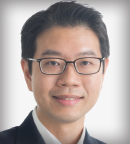Invited discussant of the phase II APPLE trial, Daniel SW Tan, BSc, MBBS, PhD, of the National Cancer Centre Singapore, noted that 17% of patients have had only molecular disease progression and were switched over to the sequential strategy. “This may be in some parts related to the sensitivity of the assay,” said Dr. Tan, who suggested a more sensitive assay may potentially identify more patients with molecular disease progression.

Daniel SW Tan, BSc, MBBS, PhD
Dr. Tan also noted the “slight imbalance” between the two study arms with respect to brain metastases. However, the comparable outcomes with respect to overall survival suggest the sequential treatment approach “may be a viable strategy in certain circumstances,” he said. “There could also be a difference when we combine this approach with radiation, which may warrant starting upfront with a first-generation tyrosine kinase inhibitor,” he added.
‘Intriguing Signal’
Despite the relatively small sample size of this randomized phase II study, Dr. Tan called the potentially improved overall survival outcomes with the use of molecular disease progression an “intriguing signal.”
“One of the major liabilities of using a first-generation strategy upfront is protection, which was shown in the subgroup analysis, but the circulating tumor DNA clearance provides us with a data point to potentially adapt treatment in patients who are at poor risk after initiating a tyrosine kinase inhibitor,” said Dr. Tan. “However, this is at best signal-finding to guide future studies.” Finally, taking a global view of lung cancer, Dr. Tan noted there are still many underserved populations where earlier-generation tyrosine kinase inhibitors may be a viable strategy, and a sequential approach would be “pragmatic as a treatment modality,” he noted.
“The APPLE trial may provide at least some signal that a first-generation tyrosine kinase inhibitor might not compromise long-term outcomes if there was an opportunity to switch later,” Dr. Tan concluded. “We now have the potential to risk stratify patients upfront, treat and evaluate them with a range of different exploratory endpoints, and potentially adapt as we go along.”
DISCLOSURE: Dr. Tan reported financial relationships with ACM Biolabs, Amgen, AstraZeneca, Bayer, Boehringer Ingelheim, C2i Genomics, DKSH, GlaxoSmithKline, Merck, Novartis, Oncoshot, Pfizer, Roche, and Takeda.

